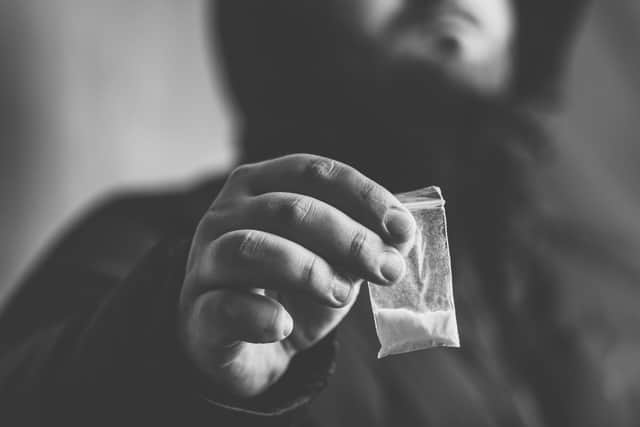Drug-related deaths: how many people have died from drugs in England and Wales in 2021 - why figures are high
and live on Freeview channel 276
The deaths were driven primarily by opiates, according to the Office for National Statistics (ONS).
But how much has drug-related deaths risen by and why is this the case?
Here’s what you need to know.
What do the latest figures show?
Advertisement
Hide AdAdvertisement
Hide AdNew figures from the ONS show that there were 4,859 deaths related to drug poisoning registered in 2021 - a rate of 84.4 deaths per million people.
This is the ninth consecutive annual rise, up 6.2% from the previous year.
It is also the highest number since records began more than a quarter of a century ago in 1993.
Around half of the deaths registered in 2021 will have occurred in previous years due to death registration delays.


Which drugs are related to the high number of deaths?
Advertisement
Hide AdAdvertisement
Hide AdThe ONS said the overall rising trend over the past decade has been driven primarily by deaths involving opiates, but also those involving other substances such as cocaine.
In the last year there have been “significant” rises from 2020 in deaths involving cocaine, methadone and new psychoactive substances.
Why is this the case?
The ONS said possible explanations for the rise could be that there is an ageing cohort of drug users experiencing the effects of long-term use and becoming more susceptible to a fatal overdose.
New trends, which involve taking specific drugs, such as benzodiazepines, alongside heroin and morphine, may increase the overdose risk.
What do the figures cover?
Advertisement
Hide AdAdvertisement
Hide AdThe ONS figures cover drug abuse and dependence, fatal accidents, suicides and complications involving controlled and non-controlled drugs, prescription and over-the-counter medications.
How have drug-related deaths risen?
The figures show that the rates of drug-related deaths have risen 81.1% since 2012, when there were 46.6 deaths per million people.
Of the deaths registered last year, 3,809 were due to accidental poisoning, while there were 927 instances of intentional self-poisoning.
Some 119 deaths arose from mental and behavioural disorders as a result of drug use, and four deaths followed assault by drugs, medicaments and biological substances.
Advertisement
Hide AdAdvertisement
Hide AdAlmost two-thirds (3,060) of the deaths were related to drug misuse, and just under half (2,219) involved an opiate.
Some 840 deaths involved cocaine, which was up 8.1% from 2020, and more than seven times the number recorded a decade ago (112 deaths in 2011).
There were also 663 deaths involving methadone registered in 2021, a 28.5% rise from the previous year (516 deaths).
A total of 258 deaths involving new psychoactive substances were also registered, this being up 88.3% from the previous year (137 deaths).
What about regional rates?
Advertisement
Hide AdAdvertisement
Hide AdPeople in the North East were more than three times more likely to die due to drug misuse than people in the East (104.1 deaths per million versus 27.4 deaths per million).
They were also more than three times more likely to die from drug poisoning than people in London (163.4 deaths per million versus 47.6 deaths per million).
Rates of drug misuse deaths also continued to be high among Generation X, who were born between the late 1960s and early 1980s.
What have experts said about this?
Mike Trance, chief executive of the Forward Trust, said the rise in drug-related deaths comes amid people mixing substances, known as “poly drug use”.
Advertisement
Hide AdAdvertisement
Hide AdHe told the PA news agency: “I think the pandemic has made things worse. Most deaths are what we call deaths of despair – people who are lonely, they’re using drugs in situations where they don’t have support or other people to protect them. And that was definitely worse during the pandemic.
“So I think that does have an effect, and that’s what we have to bear down on. We need to provide much better support and inclusion to people who are living very isolated, marginalised lives.”
Mr Trance also hit out at the “tough language” of condemnation from politicians and other public figures about clamping down on people who use drugs.
He said: “That message is absolutely the opposite of what we should be saying to people who are struggling with drug addiction.
Advertisement
Hide AdAdvertisement
Hide Ad“We should be saying that society cares about you. Society offers help. And, you know, if you reach out for that help, then you can turn your life around and make things better.”
The charity Turning Point also called for the Government to continue to invest in “life-saving” health, housing and social care services.
Dr David Bremner, group medical director and a consultant psychiatrist in addictions at the charity, told PA: “We need to ensure that the funding results in a reversal of these death rates at a pace that we would find acceptable if this was any other cause of death.
“If these were cancer deaths increasing at this rate, we would expect action at a certain pace that I believe we should expect the same for persons with addiction.”
Advertisement
Hide AdAdvertisement
Hide AdA Government spokesman said: “Our landmark drug strategy will help rebuild drug treatment and recovery services to better support people through recovery, as well as tackling the criminal supply chains which fuel illegal drug markets.
“This will help to prevent nearly 1,000 deaths, deliver over 54,500 new treatment places – a 19% increase on current numbers – and support 24,000 more people into recovery from substance dependency.
“This funding is additional to the annual public health grant spend and builds on the £80 million put into treatment services in 2021 which worked to decrease drug-related deaths by helping services distribute more naloxone, which can help reverse opiate overdoses.”
Comment Guidelines
National World encourages reader discussion on our stories. User feedback, insights and back-and-forth exchanges add a rich layer of context to reporting. Please review our Community Guidelines before commenting.
